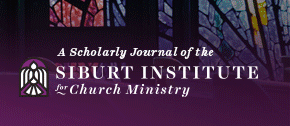This page provides instruction to authors on how to format material for submission to this journal.
Documents to submit (separately):
- Abstract – 150-200 words (this portion of the submission should not name the author directly)
- Article – Meeting the word length for its genre (listed in Aims and Scope), including footnotes, in the style described below. Generally--unless the work focuses on the theology, intervention technique, or evaluation method--the typical article might have the following elements: context (a brief description), problem, theology, intervention, evaluation and outcomes, and discussion. The discussion may include: positives, negatives, learning, and possible improvements gained from the study. Either the author will remove information potentially identifying the author of the submission through the peer review stage; after that, identifying information will be restored.
- Brief author biography – Submit a brief (150-200 words) biography of the author for inclusion with the article.
Style
- Authors will submit Word documents in English with standard fonts, one-inch margins, and double-spacing.
- Articles will use footnotes (not endnotes) to help readers locate the author’s sources; although those footnotes should be complete, their number should be minimal because the word count includes them. No “Works Cited” list or "Bibliography" is necessary.
- Authors will use Chicago/Turabian Style to format their work.
- Writers will avoid using contractions, passive language, excessive quotations and incomplete sentences. Authors should also avoid the use of second-person language (except in quotations). Judicious use of first person language is permissible, especially when it reports past action relevant to the project thesis, for example: “I met with . . .” or “I polled the focus group . . . .” Some usages of first person are not wise: “I think . . .”; “I believe . . .”; or “. . . in my opinion.”
- Precise language is commendable; obscure words are not. If technical language is necessary for the article, then the author should define these terms, especially if the author uses that terminology in a contextually unique way.
- Writers should avoid unnecessary use of any foreign language; when necessary, authors should translate such language and transliterate any biblical language.
- Authors who want their work to move forward to peer review must carefully proofread and edit their work before submitting it.
Submission On-line
- Although authors may have written extensively about this work in a project/thesis, they will have neither published this article nor have submitted it simultaneously to another publication.
- Authors will follow the specific directions for submitting articles as they go through the online submission process.

